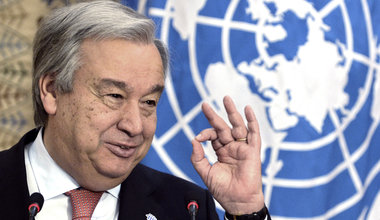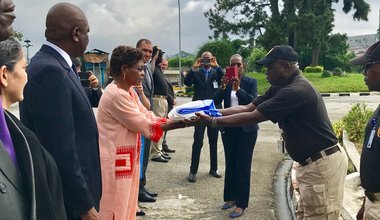Daily Brief on Cote d'Ivoire for Wednesday, 14 November 2007
Highlights
-Mayor and Prefet say they welcome UNOCI troop redeployment in Divo
-Mixed brigade soldiers demonstrate against non-payment of allowances
-Towns in Gagnoa area complain of increased attacks by bandits
Redeployment of UNOCI troops
The Mayor of Divo and the Prefect of South Bandama region in the south of Cote d'Ivoire yesterday told UNOCI peacekeepers patrolling the area that they would be happy to see the Mission's troops deployed in the region. The Mayor said that though he did not have the full details, he would be happy to have the Mission's troops deployed in Divo and would discuss the matter with the Prefect. It should be recalled that Divo has been consistently hostile towards UNOCI personnel since the start of the Mission. Peacekeepers have often been prevented from patrolling in the town by large crowds of angry demonstrators. UNOCI's planned redeployment to the city results from the signing on 4 March 2007 of the Ouagadougou Political Agreement, under which it was agreed that UNOCI troops would withdraw from the ex-Zone of Confidence - an area which separated the north and south of the country - and redeploy elsewhere.
A reconnaissance team from MORBATT yesterday visited PAKBATT's camp in the western town of Duékoué in connection with the ongoing redeployment of the Mission's troops in different parts of Cote d'Ivoire. MORBATT and PAKBATT will start moving into each other's area of responsibility on 23 November 2007.
Demonstration
Soldiers from the Integrated Command Centre (ICC)'s military detachment in the western town of Bangolo yesterday blocked roads between Duékoué and Man. They were demonstrating against the non-payment of their allowances for providing security at Mobile Court hearings. Members of the Bangolo Mixed brigade also joined the demonstration, claiming they, too, had not been paid their salaries in the last seven months. The Chief of the ICC's disarmament, demobilisation and reinsertion (DDR) cell tried to negotiate with the soldiers. The roadblocks were removed at midnight last night only to be re-established at 7.15 a.m. this morning. They were finally removed at 8.45 a.m. today. In a similar issue, Mobile Court hearings were today cancelled for the third day running in the central towns of Bouaké and Djebonoua due to the non-payment of allowances to soldiers providing security.
Security
A UNOCI patrol which went to Brabodougou village in the Gagnoa area in western Cote d'Ivoire on 12 November 2007, met with the secretary of the village chief, who informed them that despite frequent patrols by the local Gendarmerie unit, the security situation in the village was bad because of frequent attacks by bandits. The secretary of the village also informed the patrol that Mobile Court hearings had already been held in the village and many people now had ID cards. Meanwhile, a Military Observer patrol which went to Tableguikou, another village in the area, on the same day was told that attacks by bandits were making life difficult for residents. The village chief said they were pleased to see the first UNOCI peacekeepers in their village and hoped they would deter the bandits, who operate on the road between Divo and Guitry. He said that coffee and cocoa buyers had been robbed of 6 million CFA francs on Saturday, 10 November 2007, and that one man was killed during the attack.
In Divo, southern Cote d'Ivoire, a routine patrol yesterday met with the city's mayor who informed them that the security situation was good but bandits were operating in surrounding villages and towns. The patrol also met members of the Gendarmerie, who informed them that due to a shortage of logistics and human resources to cover all the area, bandits were operating freely in the surrounding areas.
A PAKBATT patrol was yesterday sent to Nanadi village, some 15 km from Duékoué in the west of Cote d'Ivoire, following reports of gunfire being heard by some villagers. The patrol searched the area, but found nothing. It, however, stayed in the village for two hours before returning to the PAKBATT camp in Duékoué.
A BENINBATT special information patrol was yesterday sent to Zeaglo village in the Blolequin area in western Cote d'Ivoire to carry out further inquiries about a missing baby from the village. The child, aged 22 months, disappeared on 9 November 2007. The patrol advised the parents to get in touch with the Gendarmerie Brigade in Bloléquin.
A minibus carrying a group of Guineans from Cote d'Ivoire to Guinea was attacked by armed masked men near the northewestern town of Samantiguila, close to Odienné, on Saturday 10 November 2007. The attackers escaped with 5 million FCFA and other valuables. Two people were slightly injured during the attack and some alleged that girls had been raped, but this information could not be confirmed. The minibus continued on to Guinea the following day, 11 November 2007.
Military
BANBATT and MORBATT yesterday conducted air reconnaissance in their respective areas of responsibility.
Arms embargo
An arms embargo inspection was yesterday successful conduct by UNOCI peacekeepers at the Forces Nouvelles Mobile Gendarmerie camp in Korhogo.
Civil Affairs
On 13 November 2007 the Civil Affairs Office in Korhogo noted the resolve of the préfectoral corps to ensure that they take the lead in matters relating to the administration. A ceremony marking the launch of this year's school enrolment campaign in Napié, sponsored by UNICEF, was officially opened by the Sous-préfet of Tioroniaradouogou instead of Napié's own Sous-préfet, who was out at the instruction of the Préfet of the Savannah region. Present at the meeting, the Forces Nouvelles Sector Commander (COMSEC) in Napié paid tribute to the Sub Prefect in his capacity as head of the administration in the area. Napié is 20 km south of Korhogo.
On 13 November, the Civil Affairs Office in Yamoussoukro met with a representative of a group of about 50 internally displaced persons (IDPs) who are looking for financial support for a livelihood project and assistance to return to their places of origin. The Office introduced the IDPs' representative to the association Fin des Larmes des Mères Victimes (FLAMVI), an association that assists IDPs in Yamoussoukro, for possible collaboration. The Office will continue to follow up the IDP situation in the Lake region.
Human Rights
On 12 November the Regional Human Rights Office in Bouaké reported that four Forces Nouvelles (FN) soldiers under the command of Issiaka Ouattara alias Wattao ill-treated a Mr. Ouflo N'Guessan Charles, a staff member of the NGO "Maison de L'Enfance" on 11 November. The four soldiers severely punched and kicked him in the face as he was walking near Wattao's residence. The Office met the victim and noted visible marks of ill-treatment on his body. He also had wounds on his face and right leg. The Office advised him to file a complaint with the police. The Office intends to meet with Adjudant-Chef Camara, Wattao's Chief of Cabinet, to discuss the case. [Comments: UNOCI has, in the past, frequently documented similar cases of ill-treatment committed by military security guards posted at the residence of Wattao against passers-by. No action has so far been taken against any of these soldiers, despite Mr. Wattao's stated commitment to address the issue.]
On 12 November, the Regional Human Rights Office in the western town of Duékoué held a working session with the International Rescue Committee (IRC) to discuss the case of a young Baoulé woman aged 19 who was allegedly raped by four men from the Guéré community in Tahably-Blodé village, situated 15 km from Duékoué, on the night of 10 October. The victim lodged a complaint at the Duékoué gendarmerie on 15 October. No criminal investigation has been launched against the alleged perpetrators. The Office is following the case.
With a view to monitoring the situation of internally displaced persons (IDPs), the Regional Human Rights Office in Bouaké together with the United Nations High Commissioner for Refugees (UNHCR), the Norwegian Refugee Council (NRC) and the NGO Care conducted a field visit to Diabo, situated 20 km west from Bouaké, to evaluate the IDPs situation, on 12 November. The IDPs reiterated their desire to return to their camps in the Bloléquin region, which are currently occupied by members of the "Guéré" community. They also stated that they were suffering from lack of services including education and access to health centers. The mission advised them to register themselves with the Ministry of Solidarity and War Victims so that they can be taken into account in the Government's IDPs support programme.
On 9 November, seven FN members under orders from the Zone Commander of Vavoua Zacharia Koné, shot in the air, rounded up and arrested twenty Muslim worshippers, including Imam Doumbia Djiniba, at the Wahabi Mosque in Bazra. They also molested other people outside the mosque. The 20 arrested people were detained at the Vavoua gendarmerie before being released following the intervention of the Daloa Regional Human Rights Office. The assault on the Mosque and the arrest of the Imam followed a dispute between Sunni and Wahabi Moslems over Friday prayers. The Sunni Moslems requested the FN Commander to prohibit preaching by other Mosques and to limit their Friday worship to prayers only. The 9 November incident at the Wahabi Mosque came about after the Imam allegedly defied the Zone Commander's ban on preaching at the mosque during Friday prayers.
Humanitarian
JORBATT yesterday distributed 200 school bags and other school supplies to the Sabeel Al Najah school in Abidjan.
Miscellaneous
Military Observers from Bouaké yesterday reported that 200 people in Konsou village on the road between Bouaké and Beoumi, had contracted a cough after drinking contaminated water from ponds and puddles due to a shortage of clean water in the village. In response to the report, UNOCI's Civil-Military Co-ordination (CIMCORD) office contacted the World Health Organisation and UNICEF representatives in the city to try to see how the villagers can be helped.
 ONU
ONU Nations Unies Maintien de la paix
Nations Unies Maintien de la paix




